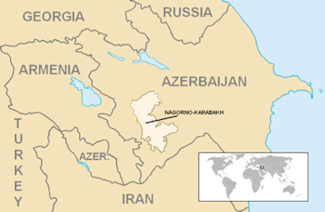This guest post was written by Onnik Krikorian and originally appeared on the World Development Report 2011 blog on August 6, 2010.
In the 16 years since a 1994 ceasefire agreement put the conflict between Armenia and Azerbaijan over the disputed mainly-Armenian populated territory of Nagorno Karabakh on hold, peace remains as elusive as ever. The war fought in the early 1990s left over 25,000 dead and forced a million to flee their homes, leaving ethnic Armenian forces, backed by Armenia proper, in control of over 16 percent of what the international community considers sovereign Azerbaijani territory.
The situation, perhaps, is typical for many frozen conflicts, but what makes this dispute even more complicated is the almost constant rhetoric of hatred from both sides. Nearly two decades after the troubles broke out, new generations of Armenians and Azerbaijanis are unable to remember the time when both lived side by side together in peace. Armenia's last president, Robert Kocharian, for example, declared that the two were 'ethnically incompatible' while his Azerbaijani counterpart, still incumbent Ilham Aliyev, regularly threatens a new war.
Regional analysts fear that such threats are not merely empty words. Fueled by massive oil revenue, the Azerbaijani military is rapidly re-arming itself and the August 2008 war between Russia and Georgia over South Ossetia was enough of a wake-up call for the international community to once again direct attention towards unresolved conflicts in the Caucasus.
In such a situation, perhaps, the possibility for reconciliation looks bleak, especially when the local media on both sides regularly perpetuates negative stereotypes of the other, often publishing little more than propaganda and in some cases even misinformation. "Without more accurate and unbiased information [...] free of negative rhetoric and stereotypes, Armenians and Azerbaijanis will continue to see themselves as enemies without any common ground," read a recent report on the local media from the Caucasus Resource Research Center.
Yet, in the past 18 months, unprecedented development in cross-border communication can be found on the popular social networking site, Facebook, where a new breed of young activists in both Armenia and Azerbaijan are now able to virtually cross the ceasefire line.
Although not intended at the time, the first tentative steps towards this happened through Global Voices, a citizen media site co-founded by Harvard University researcher Ethan Zuckerman and former CNN Tokyo and Beijing Bureau Chief Rebecca MacKinnon. As Caucasus editor for the site, my own initial physical contact with Azerbaijani bloggers soon led to meeting many more online. Through a combination of email, chat programs, social networks and blogs, relationships were built online, setting the scene for future cooperation.
But the real breakthrough happened in July 2009 when two video blogging youth activists, Adnan Hajizade and Emin Mili, were detained and later imprisoned in Azerbaijan. Global Voices became the main online resource to continuously follow the case, and as some Armenians began to take notice, they also began to make contact with their counterparts on the other side. Indeed, if it was once unthinkable for such open communication to occur, it soon become something almost routine.
ONNIK KRIKORIAN is a freelance journalist and photographer from the United Kingdom now based in Yerevan, Armenia. He is also the Caucasus Regional Editor for Global Voices and blogs for the Frontline Club. Global Voices Executive Director Ivan Sigal has also penned a report, Digital Media in Conflict-Prone Societies, for the Center for International Media Assistance.
